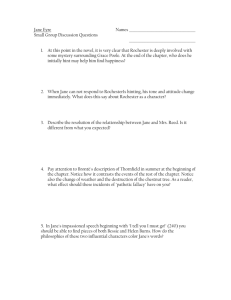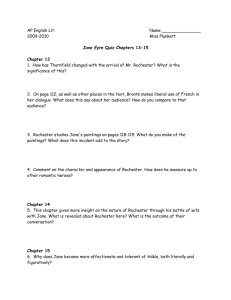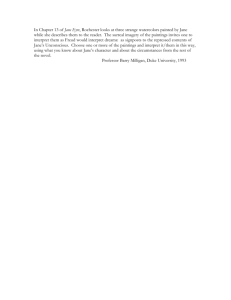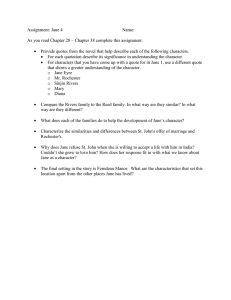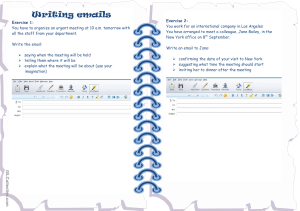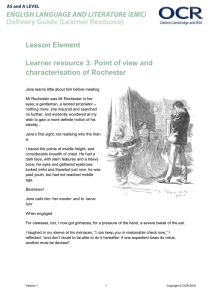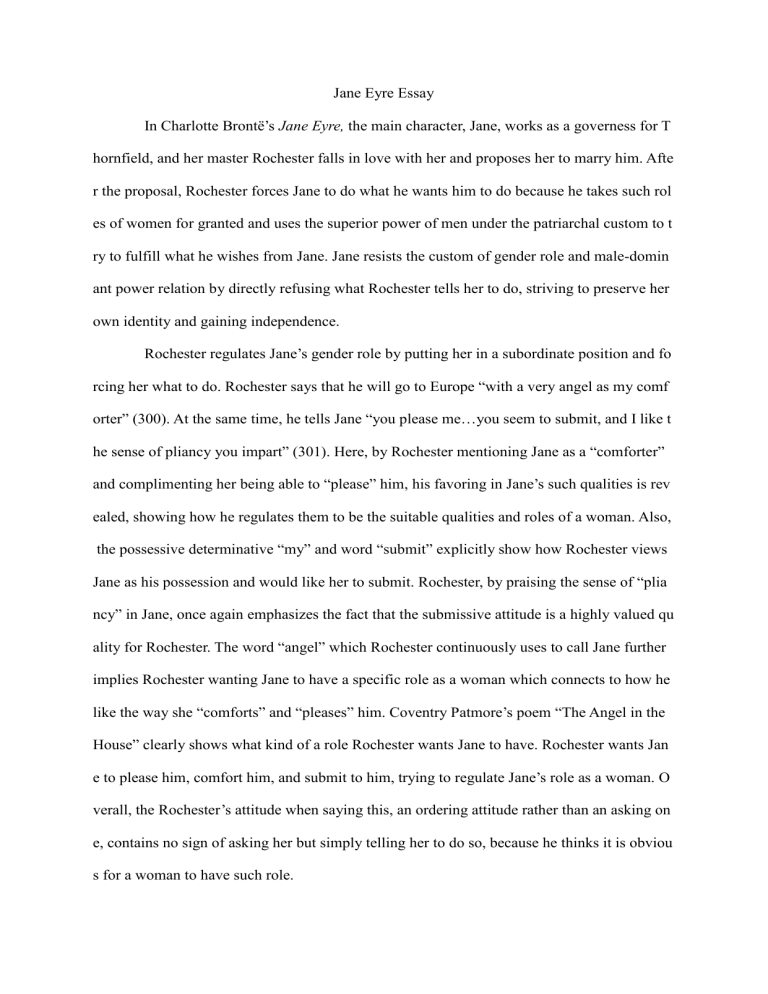
Jane Eyre Essay In Charlotte Brontë’s Jane Eyre, the main character, Jane, works as a governess for T hornfield, and her master Rochester falls in love with her and proposes her to marry him. Afte r the proposal, Rochester forces Jane to do what he wants him to do because he takes such rol es of women for granted and uses the superior power of men under the patriarchal custom to t ry to fulfill what he wishes from Jane. Jane resists the custom of gender role and male-domin ant power relation by directly refusing what Rochester tells her to do, striving to preserve her own identity and gaining independence. Rochester regulates Jane’s gender role by putting her in a subordinate position and fo rcing her what to do. Rochester says that he will go to Europe “with a very angel as my comf orter” (300). At the same time, he tells Jane “you please me…you seem to submit, and I like t he sense of pliancy you impart” (301). Here, by Rochester mentioning Jane as a “comforter” and complimenting her being able to “please” him, his favoring in Jane’s such qualities is rev ealed, showing how he regulates them to be the suitable qualities and roles of a woman. Also, the possessive determinative “my” and word “submit” explicitly show how Rochester views Jane as his possession and would like her to submit. Rochester, by praising the sense of “plia ncy” in Jane, once again emphasizes the fact that the submissive attitude is a highly valued qu ality for Rochester. The word “angel” which Rochester continuously uses to call Jane further implies Rochester wanting Jane to have a specific role as a woman which connects to how he like the way she “comforts” and “pleases” him. Coventry Patmore’s poem “The Angel in the House” clearly shows what kind of a role Rochester wants Jane to have. Rochester wants Jan e to please him, comfort him, and submit to him, trying to regulate Jane’s role as a woman. O verall, the Rochester’s attitude when saying this, an ordering attitude rather than an asking on e, contains no sign of asking her but simply telling her to do so, because he thinks it is obviou s for a woman to have such role. Jane strongly resists Rochester by opposing to the role Rochester gives her. She tells Rochester “I am not an angel…and I will not be one till I die: I will be myself” (300). Jane di rectly denying being the “angel” with a firm attitude shows her strong will for not being subo rdinate to Rochester. Also, how she says it with the repetition of ‘be’ verb represents how stro ngly she thinks about and wants to secure her identity. The fact that she uses present tense at f irst and then future tense, added with “till I die” gives an even stronger feeling of how strong her will to not become an “angel”, a subordinate character is. Finally, she saying “I will be m yself” clearly states that she will stay as the person who she is, once again implying her stron g will to preserve her own identity. Rochester uses the superior power relation to make Jane more dependent to him, lead ing to the strengthening and finally continuation of such power relation. When Jane and Roch ester go to Millcote, Jane is “ordered to choose…dresses” and when Jane only chooses two, Rochester still wishes to “see [Jane] glittering like a parterre” (309). Rochester’s intentions an d thoughts are explicitly revealed when he “[orders]” Jane to choose dresses. Rochester forcin g Jane to choose expensive, silk dresses which only he can afford connotes his intention of m aking Jane even more economically dependent to him, and also explicitly shows him trying to make Jane look like a figure he wants her to look like. Jane being described as a “parterre”, o rnamental flower border (564), includes the meaning of looking down on Jane as a material to decorate, not a human being who can decorate oneself. Right after that, Rochester tells Jane “you will give up your governessing slavery at once” (311). Despite the fact that quitting the j ob is Jane’s decision, Rochester’s tone here is an ordering tone, not an asking tone, connoting his thought that it is obvious for her to listen to him and that he has the authority to give her orders. Also, the word “slavery” implies that Rochester looked at Jane as a subordinate figure being a governess. By forcing Jane to become more independent to him, with his superior po wer, Rochester intends to sustain the power relation between him and Jane. Jane refuses Rochester’s offer of buying her clothes and his suggestion to quit her job in order to gain independence from the subordinate relation with Rochester. Jane strongly res ists to Rochester by saying “I shall not” and “I shall continue to act as Adèle’s governess; by t hat I shall earn my board and lodging…I’ll furnish my own wardrobe out of that money” (31 1). Instead of showing weakness in her will by politely refusing his offer of quitting the job, b y using “shall not”, a conclusive tone, she directly resists to his suggestion to quit. Her decisi on of continuing to be a governess not only simply shows her resistance to Rochester’s orders , but also her will to gain independence. The fact that she claims to “earn [her] board and lodg ing” implies that she will not economically depend on Rochester, but earn money from him b y doing work. Also, saying that she will “furnish [her] own wardrobe out of that money” sho ws her declaring that she will buy her own clothes with the money she earns from working. B y doing this, Jane appeals to Rochester that she will not rely on his wealth, thus gaining indep endence from him. The way Rochester unfairly treats Jane is based on certain patriarchal aspects, and Ja ne strongly resists them by disobeying Rochester. At the end of the novel, Jane finally marries Rochester, and it is controversial whether she gave up to patriarchy or embraced Rochester a s an equal figure. Nevertheless, in most parts of the novel, including these two passages I cho se, Jane remains a strong figure who resists many aspects of patriarchy and preserves her own identity.
